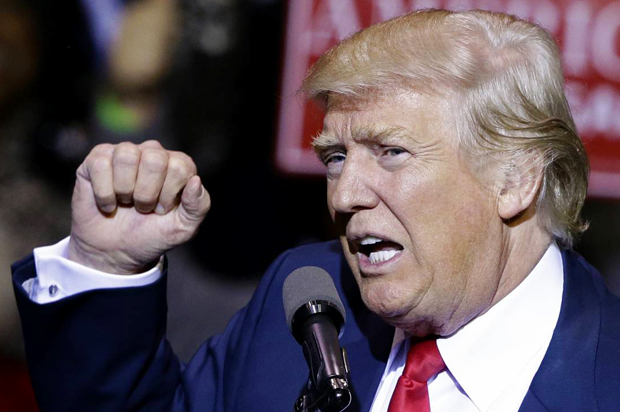Since Donald Trump’s upset victory on Election Day, many of his critics have been calling upon members of the Electoral College to refuse to cast ballots on his behalf, even if a majority of voters in their respective states had done so.
Thus far on Monday, as electors meet in the 50 state capitals, Trump has had no defections from the Electoral College, the official body assigned by the Constitution with the job of electing the president. Trump’s former opponent Hillary Clinton, however, suffered her first defection early in the day in Maine, when elector David Bright cast his ballot for the man that Clinton beat in capturing the Democratic presidential nomination, Bernie Sanders.
In a statement posted to his Facebook page, Bright said that he was casting his vote to fit with the wishes of Maine Democrats, who had voted in their party caucuses for the Vermont senator by a margin of nearly 2 to 1: “I am not a Clinton elector, I am a Democratic elector. I do not represent Democrats all over the country, I represent the Democrats in Maine.”
Bright, who ran as a delegate seeking to represent Sanders at the Democratic National Convention, said that he would have cast a ballot for Clinton if there had been a chance of Trump’s losing the Electoral College vote. He didn’t see that as likely, however.
“If my vote today could have helped Secretary Clinton win the presidency, I would have voted for her. But as the Electoral College meets all across this nation on this day, I see no likelihood of 38 Republican electors defecting from their party and casting their ballots for Secretary Clinton.”
Bright’s refusal to vote for Clinton appears to have run afoul of Maine law, which directs the state’s presidential electors to vote in accordance with the voters of their respective congressional districts or the statewide popular tally. Clinton won Maine’s popular vote on Election Day.
In an interview with the state’s largest newspaper, the Portland Press Herald, Bright brushed off the legal requirement:
“Maine also has a law that you’re not supposed to go faster than 70 on the interstate,” the publication quoted him as saying. “I suspect that I’m going to break that law on my trip to Augusta this morning, too.”
According to the paper, Maine is one of 30 states that require electors to vote in accordance with the popular vote. Typically, the penalty for refusing to follow the requirement is a fine. No elector has ever been penalized, according to the National Conference of State Legislatures.
Update: 2:55 p.m. ET: Another elector in Minnesota tried to defect from Clinton. Muhammad Abdurrahman, a former Sanders DNC delegate, cast a ballot for the Vermont senator but was removed from his office and replaced by an alternate who voted for Clinton as per Minnesota law before the state’s official totals were submitted.
Update: 3:02 p.m. ET: After Bright cast his first ballot for Sanders, he switched his vote to Clinton on a second ballot since his initial vote was ruled out of order.
Update: 03:15 p.m. ET: In Colorado, one elector attempted to cast a ballot for Ohio Gov. John Kasich but his vote was invalidated by Colorado Secretary of State Wayne Williams. The vote for Kasich was an apparent nod to the “Hamilton Elector” strategy of persuading Democrats and Republicans to cast votes for an alternative Republican candidate. Clinton won Colorado’s popular vote on Election Day.
Update 3:57 p.m. ET: In Washington, four of the 12 electors broke with the voters. Instead of choosing the state’s popular vote winner, Hillary Clinton, three chose former Army general Colin Powell, one opted for environmental activist Faith Spotted Eagle.
Update 5:14 p.m. ET: There have been no Donald Trump defections thus far. Protests broke out in Wisconsin when all of the electors cast their ballots for the GOPer in accordance with the state’s popular vote:
Demonstrators erupt after Wisconsin's 10 presidential electors cast their #ElectoralCollege ballots for Republican Donald Trump. pic.twitter.com/A0GrASaIbY
— Bill Ruthhart (@BillRuthhart) December 19, 2016
Texas remains the final state whose electors Donald Trump won in its popular vote. Its electors are meeting right now and are beginning to cast their vote. As of this writing, across all states, Trump has 268 electoral votes. Texas has 38 electoral votes.
Update 5:28 p.m. ET: Texas has now officially cast its Electoral College ballots. Trump received 36 votes, Ron Paul received 1 vote and John Kasich received 1 as well. Trump’s final national tally was 304 votes. Congress will meet in joint session on Jan. 6 for the official vote count. Trump is expected to be declared the winner.
Update 12/20 1:26 p.m. ET. Hillary Clinton had another defector as one of Hawaii’s electors voted for Bernie Sanders. Clinton’s final national total was 227. In total, there were 7 faithless electors. Two declined to vote for Trump, five declined to vote for Clinton.

